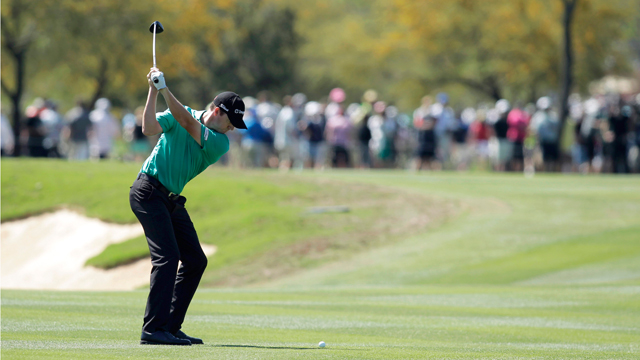NEWS
Walker's lesson: Remain 'in the moment'

One of the great things about golf is the relaxing pace. But that can also be a downfall. In a three- to four-hour round, the average golfer takes between 70 and 100 swings, leaving a lot of time in between shots to think about anything but golf.
It's difficult to stay focused on any task for that amount of time, even for PGA Tour pros. With so much at stake -- and the pressures, both externally and self-imposed -- it's no surprise that one bad stretch can snowball into a horrible round.
VALERO TEXAS OPEN: Walker wins in hometown | What's in Walker's bag?
Consider that in the last nine tournaments prior to Sunday's Valero Texas Open, the third-round leader had failed to maintain that advantage on the final day. That is, until Jimmy Walker shook off some early bogeys at TPC San Antonio to finish with a flourish, and the victory. Even though his lead grew to a sizeable margin during the round, Walker didn't let up -- making back-to-back birdies on Nos. 16 and 17 to slam the door shut.
He remained "in the moment," according to PGA Professional Nicole Weller, director of instruction at The Landings Club in Savannah, Ga. Walker was able to maintain his focus on the task, rather than allowing his mind to wander toward the result. And it's something amateur players can learn from.
It happens to everyone, even Weller. She remembered playing in a national women's tournament at Pinehurst No. 8 and was 5-under with two holes to play.
"Then on No. 17, I started thinking, 'Oh my gosh, I'm 5-under," Weller said. "And I three-jacked 17 and I think I doubled 18 because I flew the green. It's almost like it gets into your head."
Why does this happen? Weller said it's because golf is a closed-skill sport.
[wide_search_instructor]
"In sports psychology, it means you really don't do anything in the motion until you act upon it yourself -- much like a free throw in basketball or a serve in tennis," she said. "Those types of actions allow for a lot of thought and preparation. And sometimes, there's too much thought involved.
It's a topic that's intrigued Weller for some time. Her master's thesis was on the timing of a pre-shot routine. And her research led to some interesting observations.
"Players on Tour who were on top that week, if you time their pre-shot routines, they vary by less than second," Weller said. "The players down on the money list that week, their routines can vary by well over five seconds. So there's a lot of variation in thinking."
There are three parts to a pre-shot routine, Weller said: the physical preparation, the mental planning and the emotional belief system.
"That's where people get derailed," Weller said. "They just go into places that they don't trust. They get side-tracked. Most of the time, it's the 'what if,' going into the future. You have to play every shot as it comes and be 'in the now.'
"The story you need to tell yourself when you're standing over a shot has to be a good one, and it has to be something you believe in. You have to commit to what you've decided to do."
MORE LESSONS: Hone your mental game in practice
As a certified instructor for Spirit of Golf, Weller said there's a simple solution to the emotional aspect of the pre-shot routine.
"One thing you can do is find a word that you can use as part of your pre-shot routine," she said. "It not only gets you focused but you have to believe in it. Some words are designed to fire you up, some words are designed to calm you, depending on the situation."
For Weller, her word is "freedom."
"I love feeling free to do the shot that's at hand," she said.
Remaining "in the moment" requires two things, Weller said. One, you have to be aware when negative thoughts start to creep into your routine. Two, you have to be able to detach, shift your thoughts to something positive and embrace the idea before you ever take the club back.
That's the basic premise behind noted peak performance coach Tim Kremer's coaching philosophy in Spirit of Golf. It's all about trusting in your abilities and having a positive mindset, Weller said.
"If fear creeps in, even if it's just 1 percent, that crack widens open and there's no trust there," Weller said. "If you're 100 percent psyched about what you're about to do, there's no room for bad thoughts to come in."
